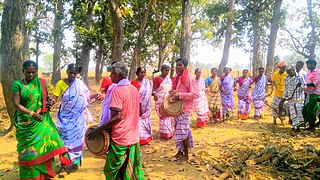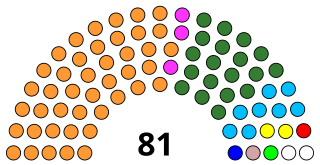Related Research Articles

Jharkhand is a state in eastern India. The state shares its border with the states of West Bengal to the east, Chhattisgarh to the west, Uttar Pradesh to the northwest, Bihar to the north and Odisha to the south. It is the 15th largest state by area, and the 14th largest by population. Hindi is the official language of the state. The city of Ranchi is its capital and Dumka its sub-capital. The state is known for its waterfalls, hills and holy places; Baidyanath Dham, Parasnath, Dewri and Rajrappa are major religious sites. Jharkhand is primarily rural, with about 24% of its population living in cities as of 2011.
Birsa Munda was an Indian tribal independence activist, and folk hero who belonged to the Munda tribe. He spearheaded a tribal religious millenarian movement that arose in the Bengal Presidency in the late 19th century, during the British Raj, thereby making him an important figure in the history of the Indian independence movement. The revolt mainly concentrated in the Munda belt of Khunti, Tamar, Sarwada and Bandgaon.

Santal Pargana division constitutes six district administration units known as the divisions of Jharkhand state in eastern India.

The Santal are an Austroasiatic-speaking Munda ethnic group of the Indian subcontinent. Santals are the largest tribe in the Jharkhand and West Bengal in terms of population and are also found in the states of Odisha, Bihar, Assam and Tripura. They are the largest ethnic minority in northern Bangladesh's Rajshahi Division and Rangpur Division. They have a sizeable population in Nepal. The Santals speak Santali, the most widely spoken Munda languages of Austroasiatic language family.

The Kurukh or Oraon, also spelt Uraon or Dhangad, are a Dravidian speaking ethnolinguistic group inhabiting Chhotanagpur Plateau and adjoining areas - mainly the Indian states of Jharkhand, Odisha, Chhattisgarh, and West Bengal. They predominantly speak Kurukh as their native language, which belongs to the Dravidian language family. In Maharashtra, Oraon people are also known as Dhangad.
Khunti is the headquarter of Khunti district in the Indian state of Jharkhand. It is in South Chotanagpur division and one of the 24 districts in the Indian state of Jharkhand. The district of Khunti was carved out of Ranchi district on 12 September 2007. It is historically known as the centre of activity of the Birsa movement. As of 2011, it is the second least populous district of Jharkhand, after Lohardaga. The district is a part of the Red Corridor.
Arki block is a CD block that forms an administrative division in the Khunti Sadar subdivision of Khunti district, in the Indian state of Jharkhand.
Rania block is a CD block that forms an administrative division in the Khunti Sadar subdivision of Khunti district, in the Indian state of Jharkhand.
Torpa block is a CD block that forms an administrative division in the Khunti Sadar subdivision of Khunti district, in the Indian state of Jharkhand.

Kariya Munda is an Indian politician who served as Deputy Speaker of the 15th Lok Sabha. He has been a minister in the Government of India, serving in the governments led by the Janata Party in 1977 and by Bhartiya Janata Party from 1999 onwards.
The Cherokee Freedmen controversy was a political and tribal dispute between the Cherokee Nation of Oklahoma and descendants of the Cherokee Freedmen regarding the issue of tribal membership. The controversy had resulted in several legal proceedings between the two parties from the late 20th century to August 2017.

Jaipal Singh Munda was an Indian politician, writer, and sportsman. He was the member of the Constituent Assembly which debated on the new Constitution of the Indian Union. He captained the Indian field hockey team to clinch gold in the 1928 Summer Olympics in Amsterdam.

Ram Dayal Munda, known as R. D. Munda, was an Indian scholar and regional music exponent. He was awarded the Padma Shri of the year 2010 for his contribution to the field of art.

Hemant Soren is an Indian politician who has served as the fifth and current Chief Minister of Jharkhand since 4 July 2024. He had previously served in the office from 2019 to 2024 and 2013 to 2014. He is also the working president of the Jharkhand Mukti Morcha, a regional party. He represents Barhait constituency in the Jharkhand Legislative Assembly since 2014 and has represented Dumka twice — from 2019 to 2020, and from 2009 to 2014. He was also the Deputy Chief Minister of Jharkhand from 2010 to 2013, Leader of the Opposition, Jharkhand Legislative Assembly from 2014 to 2019 and member of Rajya Sabha from Jharkhand, from 2009 to 2010.

The Provisions of the Panchayats Act, 1996 abbreviated as PESA Act is a law enacted by the Government of India for ensuring self governance through traditional Gram Sabhas for people living in the Scheduled Areas of India. Scheduled Areas are areas identified by the Fifth Schedule of the Constitution of India. Scheduled Areas are found in ten states of India which have predominant population of tribal communities. The Scheduled Areas, were not covered by the 73rd Constitutional Amendment or Panchayati Raj Act of the Indian Constitution as provided in the Part IX of the Constitution. PESA was enacted on 24 December 1996 to extend the provisions of Part IX of the Constitution to Scheduled Areas, with certain exceptions and modifications.
The Ninety-second Amendment of the Constitution of India, officially known as The Constitution Act, 2003, amended the Eighth Schedule to the Constitution so as to include Bodo, Dogri, Maithili and Santali languages, thereby raising the total number of languages listed in the schedule to 22. The Eighth Schedule lists languages that the Government of India has the responsibility to develop.

Droupadi Murmu is an Indian politician who has served as the 15th president of India since 2022. She won the 2022 presidential election as the Bharatiya Janata Party (BJP) candidate. She is the first person belonging to a tribal community and also the second woman after Pratibha Patil to hold the office. She is also the youngest person to occupy the post and the first president born in independent India.
Statue of Ulgulan is a proposed 150 feet tall statue of Birsa Munda, a tribal freedom fighter from the Eastern Indian state of Jharkhand. The statue will be built on NH 33 Ranchi-Jamshedpur national highway near Bundu. The announcement of Statue of Ulgulan has been made by the Ex-Deputy Chief Minister of Jharkhand and AJSU President Shri Sudesh Mahto at the Birsa Jan Panchayat held on 15 November 2016, the birth date of Bhagwan Birsa Birsa Munda at Ulihatu Village, Khunti after the unanimous approval by the Jan Panchayat. Birsa Munda's kin Sukhram Munda has been made the convener of the Statue of Ulgulan committee. The committee will go to every village in the region to apprise people about the statue and collect a stone from every household. The statue is expected to be built by 15 November 2018.

The 4th Jharkhand Assembly was constituted after the 2014 Jharkhand Legislative Assembly election
The People's Liberation Front of India (PLFI) is a militant Maoist outfits formed in 2007 in Jharkhand. Earlier it was known as Jharkhand Liberation Tigers (JLT) founded by Dinesh Gope a resident of Khunti district, Jharkhand in 2003. Later it renamed as PLFI.
References
- 1 2 Tewary, Amarnath (2018-04-14). "The Pathalgadi rebellion". The Hindu. ISSN 0971-751X . Retrieved 2020-05-21.
- 1 2 3 Angad, Abhishek (2020-01-23). "Jharkhand: Days after cases withdrawn, 7 killed over Pathalgadi". The Indian Express. Retrieved 2020-05-24.
- ↑ Kiro, Santosh K. (23 January 2020). "After Gruesome Killings, Jharkhand's Pathalgadi Movement Under Scrutiny Again". The Wire. Retrieved 2020-05-25.
- 1 2 3 Sharma, Unnati (2019-12-31). "What was Pathalgadi movement, and why Hemant Soren govt withdrew cases related to it". ThePrint. Retrieved 2020-05-21.
- 1 2 3 Maanvi (2020-01-23). "7 Killed in Jharkhand Over Pathalgadi: What Is the Movement About?". The Quint. Retrieved 2020-05-21.
- 1 2 3 Bhagat-Ganguly, Varsha; Kumar, Sujit (2019-07-30). "Understanding the Pathalgadi movement". India's Scheduled Areas: Untangling Governance, Law and Politics. Taylor & Francis. ISBN 978-1-000-22797-0.
- ↑ "'Jal, Jangal aur Jameen:' the Pathalgadi Movement and Adivasi Rights". EPW Engage. 14 October 2019. Retrieved 25 May 2020.
- ↑ "The Chota Nagpur Tenancy Act, 1908 Bengal Act 6 of 1908" (PDF).
- ↑ "Santhal Parganas Tenancy Act Jharkhand".
- 1 2 3 4 "Tribal activists expect Droupadi Murmu to be assertive as President". www.telegraphindia.com. 23 June 2022. Retrieved 21 July 2022.
- ↑ "Explained: What is the Pathalgadi movement, and what is JMM govt's stand on it?". The Indian Express. 23 December 2020. Retrieved 21 July 2022.
- 1 2 Tewary, Amarnath (13 April 2018). "The Pathalgadi rebellion". The Hindu. Retrieved 21 July 2022.
- 1 2 Dutta, Prabhash K. (27 June 2018). "Pathalgadi movement, a rebellion against government with opium taint". India Today. Retrieved 2020-05-24.
- 1 2 3 Kujur, Anupa (2019-06-27). "Jharkhand's Pathalgadi movement loses steam as fear clouds villages". The Federal. Retrieved 2020-05-24.
- ↑ "Activists Protest Repression of Tribals Engaged in Pathalgadi Movement". The Wire. 22 July 2019. Retrieved 2020-05-25.
- ↑ Sarkar, Debashish (2020-02-01). "SIT links Jharkhand killings to Pathalgadi movement, PLFI". Hindustan Times. Retrieved 2020-05-25.
- ↑ Pandey, Kundan (22 July 2019). "Jharkhand govt must engage with Khunti citizens, protestors demand". Down to Earth. Retrieved 2020-05-24.
- ↑ Mishra, Neeraj. "Terror Run". www.magzter.com. Retrieved 2020-05-24.
- ↑ Saran, Bedanti (2019-05-18). "Life term until death to Father Aind, five others, in Khunti gang rape case". Hindustan Times. Retrieved 2020-05-24.